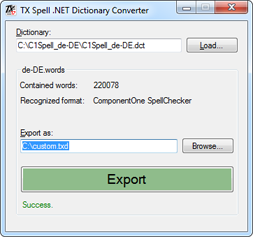
One of the key principles designing TX Spell .NET was the support for open dictionary formats. TX Spell .NET fully supports the OpenOffice.org Hunspell dictionaries which gives you access to more then 80 dictionaries out-of-the-box.
The TX Spell .NET user dictionaries are simple text-based word list files with an encoding indicator at the beginning. This easy concept allows you to create your own user dictionaries without a special dictionary manager (which, of course, is shipped with TX Spell .NET as well). The internal processing and handling of all dictionaries makes this possible.
No proprietary format is required to store the dictionaries. Internally, both dictionaries are converted into a high-performance dictionary that makes the performance outstanding. That implies that it doesn't matter which format you choose to create your own dictionaries - internally, they have the same performance.
We got many requests regarding other 3rd-party dictionaries and how to convert them into a TX Spell .NET compatible format. Most vendors offer a possibility to export the user dictionaries as text files. They can be directly used in TX Spell .NET when adding the encoding at the beginning as the first entry. For example:
SET iso-8859-1
We started a project to convert various dictionary formats directly into a TX Spell .NET compatible format.
Currently, TX Spell .NET Dictionary Converter is able to convert the following dictionary formats to TX Spell .NET's *.txd format:
- ComponentOne® SpellChecker (*.dct)
You can download the dictionary converter here:
TX Spell .NET Dictionary Converter
(TXSpell_DicConverter.zip)
We would like to extend this conversion tool. Which other formats do you need to convert?
Modified: It is not neccessary to convert user dictionaries from Keyoti's RapidSpell. They are plain text files and can be used directly in TX Spell .NET by adding the encoding flag at the beginning. If you are using binary *.DICT files from Keyoti's RapidSpell, please contact us.

